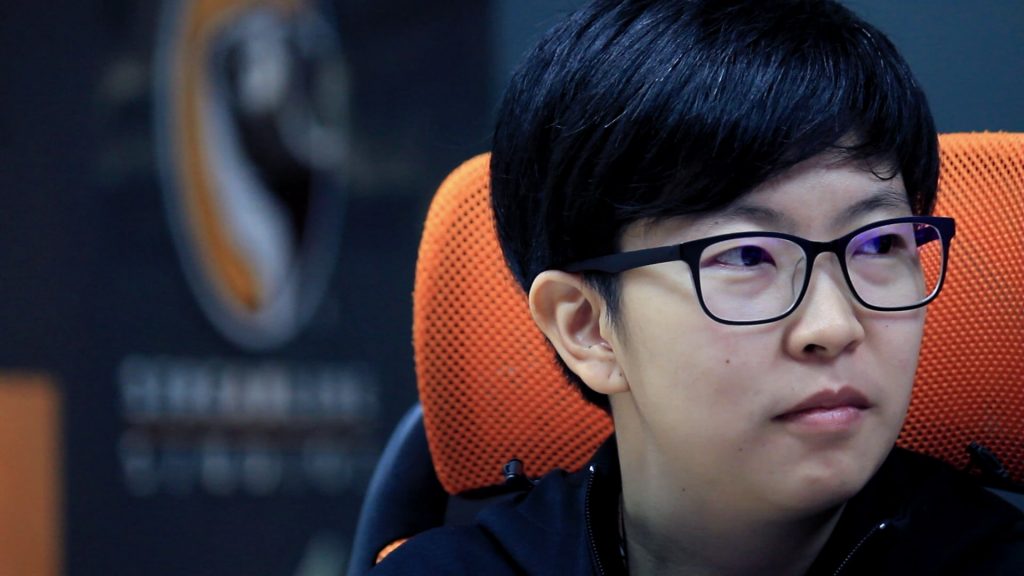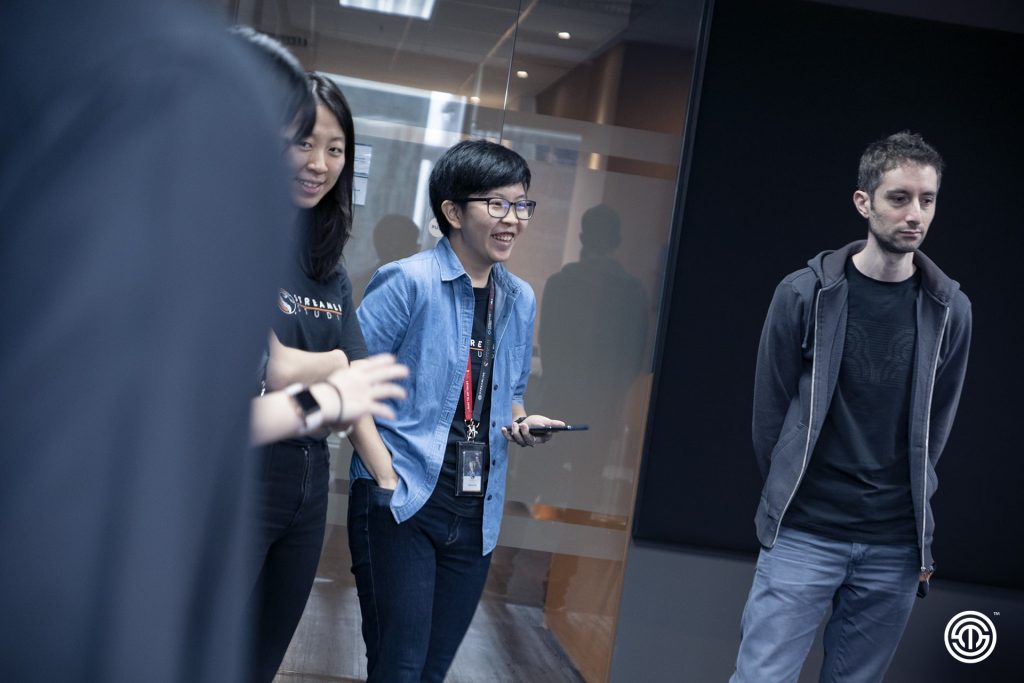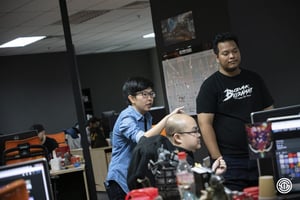Menu

Welcome to Streamline Media Group’s ongoing blog series where we interview a Streamliner from one of SMG’s business divisions.
I spoke with Sabine Ong, a project manager at Streamline Studios (SLS), to discuss what exactly a project manager does, especially for a studio such as Streamline Studios.
Streamline Studios is Streamline Media Group’s business division that covers a multitude of aspects of games development, from pre-production to post-production, and everything in-between. Since its founding in 2001, SLS has worked with international clients of all sizes to help them achieve their vision and accomplish their game dev goals.
*****
Can you please introduce yourself and your role in Streamline Studios?
Hey there! I’m Sabine, a project manager here at Streamline Studios. I have always loved video games and film since a young age so it’s a privilege to have been given the chance to work here.
How long have you been in this role? Approximately how many projects do you estimate you have worked on since becoming a project manager?
I’ve been here for a little over two years now and have worked on approximately fourteen-to-sixteen projects. Some projects are long-term while some can be as short as a month. In fact, there’s a project that I’ve worked on since I joined and it’s still ongoing!
Prior to becoming a project manager, did you have any other roles at Streamline Studios?
Nope, this is my first role in Streamline Studios or even in the video games industry.
What does a project manager do? What are your day-to-day responsibilities?
We do many things! Ultimately our goal is to make sure that the projects run as smoothly as possible on all fronts. Some examples are making sure that information is being communicated to and from all parties involved, keeping tasks on schedule or rescheduling if necessary, making sure the team has the hardware or software they need, and troubleshooting. We’re the bridge that connects and facilitates everyone in the whole process.
On top of all that, we’re working with teams that are made up of complex individuals in many different roles. We’re very entrenched with running the company so we also get involved with reviews, promotions, acclimatizing new employees, and even performance issues.

What tools and software do you use on a regular basis?
Here at Streamline, Streamframe is our go-to project management tool. We use it every day to keep track of all progress and communicate within the organization. It really helps that we have a central tool considering the number of projects we work on.
Other software we mainly use to help with our work is Microsoft Office: Excel, Word, and PowerPoint. We do occasionally use other tools which are project dependent and based on what the clients need.
What are some of the skills that are needed to be a good project manager?
The most important skills are people and communication skills. We’re constantly having to interact with all kinds of people across different languages, cultures, and regions. It’s important that we know how to listen, to communicate, and to relate to others, from clients to artists to managers on a professional level. We also need to effectively convey vision, ideas, goals, and issues as well as produce reports and presentations.

Other essential skills would be leadership, time management, planning skills, negotiation, risk management, and subject matter expertise.
The most important skills are people and communication skills.
How is the role of a project manager different when working for a studio that does co-development?
We have multiple projects and shorter timeframes. We tend to be involved with several projects at any one time so keeping a cool head is important. The pace at which we work also greatly differs; some things are more urgent and need to go at a faster speed. Because of that changes happen very often, we have to be constantly on our feet and adapt quickly to the changes that happen. This means we gain experience faster by going through more project cycles.
We also have better insight into the market as we work with multiple clients. We can see what they are doing and how different each company manages their projects. This gives us the opportunity to take the things that work for us and implement it into our own workflows.
How does your role change throughout a project, from pre-production to production, to wrapping up a project and submitting the final assets to the client?
I’d say that differs with the working style of each project manager. For me, I like to get my hands dirty and get involved with the team in the pre-production and production phases. I love to collaborate with the art director, leads, and artists on the creative process figuring out new ideas or techniques to solve the needs of our clients. Everyone involved can have great ideas so it’s up to us to facilitate that and ensure we’re all contributing to make it better.
Nearing the end of a project, we must ensure that everything has been delivered to the client, so we’ll need to facilitate the submission process. You could say that we’re a collector at this point as we gather all the work that has been done, whether it be documentation or source files, and deliver it to the client. At the same time, we would have to work on finalizing various reports and analyzing the results. It’s the time when we can look back to see what went right, what went wrong and how we can improve for the next round. Think of it as a kaizen process where we are always continuously learning and improving.
[Editor’s note: Kaizen is a Japanese word for “improvement.” In business terms, it refers to the practice of continually improving one’s business processes.]
What have you learned about being a project manager?
The key is communication. We often say that this is important but it’s also the hardest thing to do or make happen on all levels. It is the thing that drives the work and makes sure things are running smoothly. Whenever a breakdown happens, a problem tends to pop up and time is needed to fix it. One must have lots of endurance and discipline to avoid that as much as possible.
Another thing would be that to it’s okay to make mistakes. To err is human but it’s more about how we turn things around and do better. If we make a mistake, we should own up to it and avoid excuses or lay blame. We deal with the facts, see what can be done to avoid this happening again or to mitigate it as much as possible, and move forward.
Are you working on any projects that you can talk about publicly? If so, can you elaborate on what those projects are, and when we can expect to hear more about them?
Unfortunately, not now. Most projects I’m involved in are in the pre-production phases, so it’ll take a few years before I can even talk about them. But I can say I have worked with clients from all over the world like Japan, USA, and China, so that’s what’s exciting!
What’s the best part about being a project manager at Streamline Studios?
The diversity. Diverse cultures, people, and projects. I’ve worked with many people across different cultures and many different projects in scale and genres. There’s never a dull moment!
Anything else you would like to add?
It all sounds rather stressful, but I want to say that it’s been a very rewarding experience working here as a project manager. All the blood, sweat, and tears are worth it when I see what the team here at Streamline has constantly achieved and continues to strive for.
*****
Special thanks to Sabine Ong for her insight on being a project manager for Streamline Studios.
Sabine is just one of the many experienced creative team members at Streamline Studios who dedicate themselves to helping bring their clients’ projects to completion.
If you’re interested in knowing more or would like to work with Streamline Studios, please reach out to us — and we are hiring!
These Stories on Streamline Studios